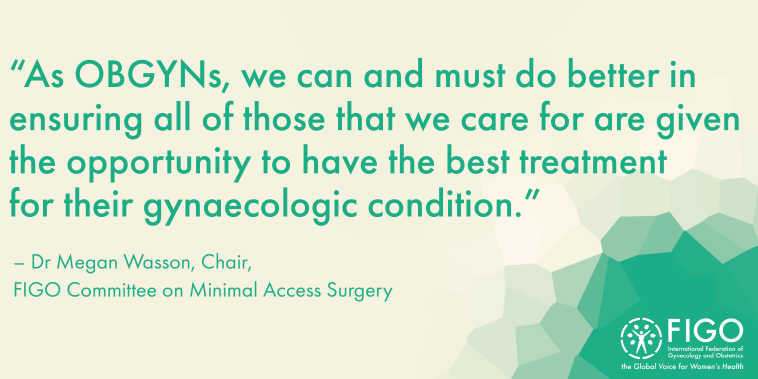#EmbraceEquity: Ensuring equitable access to life-changing minimal access surgery for women
To mark International Women’s Day 2023, FIGO is highlighting the need to embrace equity in women’s health care. A key area of improvement is in providing women with a range of options when it comes to surgery, specifically ensuring that they can access minimal access surgery as a less invasive and safer treatment option for a myriad of gynaecological challenges.

Gender inequity in receiving minimal access surgery
As highlighted in FIGO’s recent statement on disparities in patients' access to benign gynaecological surgery, women around the globe tend to receive lower-quality health care than men. When it comes to accessing surgical procedures, the gap is even greater.
In general, compared to men, women are less likely to participate in shared decision-making or to choose the type of surgical procedure they undergo. The quantity and quality of information available pertaining to surgical procedures and preoperative counselling is less optimal for women than men. Gynaecological surgery is significantly worse than other surgical specialties in terms of quality, access, information flow and safety.
As highlighted by Dr Megan Wasson, Chair of FIGO’s Committee on Minimal Access Surgery, there are clear inequities in the way medical professionals respond to women’s health concerns and issues in comparison to their male patients:
Historically, women struggling with pelvic pain or endometriosis have been told to get pregnant to manage their symptoms or that the pain was in their head. Women struggling with pain during intercourse were told to drink a glass of wine and relax. Women have been told that removing their reproductive organs is the solution and cure to all their problems. This approach is unacceptable.
Imagine a scenario where society accepted and encouraged performing bilateral orchiectomy for treatment of urologic concerns. This would never be considered or endorsed and highlights the significant differences in medical treatment options for men and women.
Advocating for better surgical options for women
According to Dr Wasson, while “it is well established that minimal access surgery has significant advantages over laparotomy, many women continue to have surgery via an open abdominal approach. What’s most alarming is that frequently, these women are not given the option of a minimal access approach, but rather are only given the option of a large incision, with increased risk of complications and prolonged recovery.”
As women are increasingly advocating for themselves and seeking the information to receive the care they deserve, it is also the role of OBGYNs to advocate for and empower women.
Women are increasingly becoming advocates for themselves. They are seeking the knowledge and understanding to empower themselves to find providers that are best skilled to care for their specific gynaecologic needs. Women are recognising the disparities in health care and making efforts as patients to close these gaps.
As OBGYNs, we can and must do better in ensuring all of those that we care for are given the opportunity to have the best treatment for their gynaecologic condition. If surgery is indicated, all women should have access to high-quality care with a minimal access approach when possible.
– Dr Megan Wasson, Chair, FIGO Committee on Minimal Access Surgery